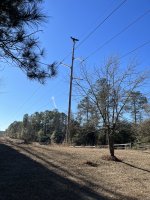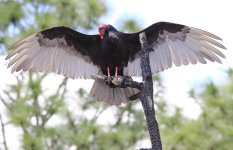We saw this majestic creature perched atop a metal pole in a utility easement (location info below). At first I thought it was some kind of patriotic statuette someone (a utility employee, I hoped) had mounted on the electrical pole. Instead, though, it was a live bird apparently showing its stuff to all who looked on. It actually shifted orientation to continue facing us as we walked by on the path below, so maybe it was warning us off its territory. It kept its wings spread the entire time we watched, which would have been about four minutes or so.
Can someone identify this bird from my
View attachment Raptor_show_vid.mov
pitiful photo and video?
And what is it doing with this spread-wing display? I'd never seen anything like it.
Location: outskirts of Aiken, South Carolina, 26 December 2022, 10:47 a.m.
Can someone identify this bird from my

View attachment Raptor_show_vid.mov
pitiful photo and video?
And what is it doing with this spread-wing display? I'd never seen anything like it.
Location: outskirts of Aiken, South Carolina, 26 December 2022, 10:47 a.m.
Last edited:






